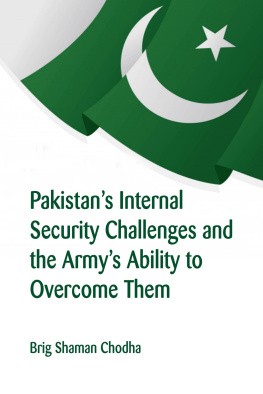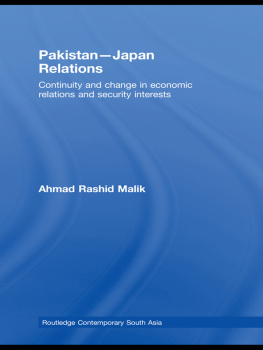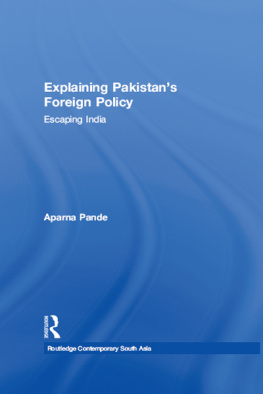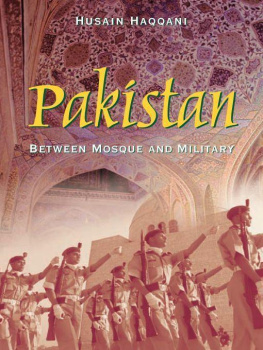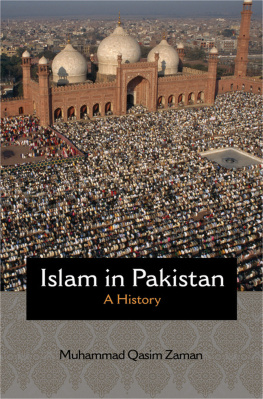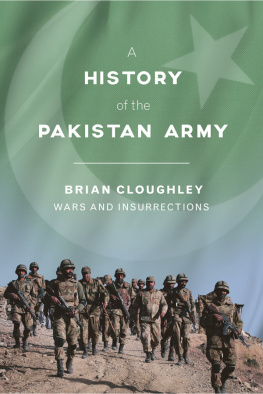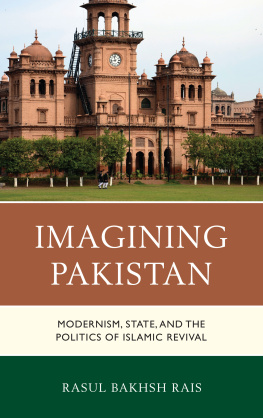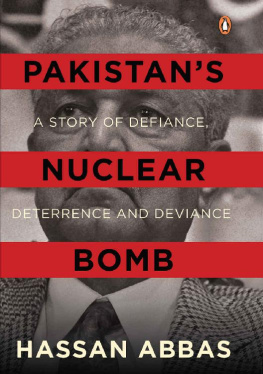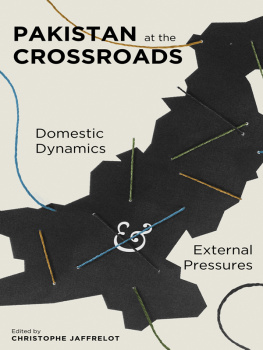MAKING SENSE OF PAKISTAN
FARZANA SHAIKH
Making Sense of Pakistan


Oxford University Press is a department of the University of Oxford. It furthers the Universitys objective of excellence in research, scholarship, and education by publishing worldwide. Oxford is a registered trade mark of Oxford University Press in the UK and certain other countries.
Published in the United States of America by Oxford University Press 198 Madison Avenue, New York, NY 10016, United States of America.
Farzana Shaikh, 2018
All rights reserved. No part of this publication may be reproduced, stored in a retrieval system, or transmitted, in any form or by any means, without the prior permission in writing of Oxford University Press, or as expressly permitted by law, by license, or under terms agreed with the appropriate reproduction rights organization. Inquiries concerning reproduction outside the scope of the above should be sent to the Rights Department, Oxford University Press, at the address above.
You must not circulate this work in any other form and you must impose this same condition on any acquirer.
Library of Congress Cataloging-in-Publication Data
Names: Farzana Shaikh.
Title: Making Sense of Pakistan
ISBN 9780190062064 (epub)
For Patrick and Emile
CONTENTS
In the preface to my first book published twenty years ago I reflected on the challenges posed to South Asian Muslims confronted with the contradictions of their faith and with the uncertainties that plagued the role of Islam in shaping the demand for Pakistan. This book returns to the theme by carrying the story forward and demonstrating the consequences for Pakistan of those unresolved contradictions. As before I feared I had set myself an impossible task, but as before I soon found myself buoyed up by the support of colleagues, friends and family without whom this project could not have been realized.
This is especially true of those in Pakistan. Many gave generously of their time; others helped open doors for me that may have remained shut: to all of them I extend my heartfelt thanks. Some, however, deserve special mention. In Islamabad and Rawalpindi Dushka Saiyid and Syed Mushahid Hussain provided me with invaluable contacts and sources. I am also deeply indebted to General (retd.) Mahmud Ali Durrani, General (retd.) Asad Durrani, General (retd.) Malik Iftikhar and General (retd.) Muhammad Rafi Khan, who agreed to spend long hours with me discussing changes in military thinking over several generations. I want to thank the Royal Norwegian Embassy in Islamabad and its ambassador to Pakistan in 2003, Janis Kanavin, for making available to me his embassys premises for a series of dialogues on Islam and Islamic education with Hafiz Muhammad Anwarul Haq Haqqani of the Dar ul Uloom-e-Haqqani in Akora Khattak, and with Hafiz Fazl-ur Rahim and Muhammad Yousaf Khan of the Jamia Ashrafia in Lahore. Among others in Islamabad who extended their warm hospitality and who shared with me their views on Pakistan were Tasneem Beg, Parwaiz Iqbal Cheema, Rifaat Hussain, Roedad Khan, Shaheen Rafi, Tariq Rahman, Ahmed Salim, Ikram Sehgal and Mohammad Waseem.
In Lahore my greatest debt is to the late Qamar F.R. Khan, a true model of generosity and matchless courage. In Lahore, I also wish to express particular thanks to Dr Mubarak Ali, the late Farrukh Aziz, Air Marshal (retd.) Zafar Choudhry, Brig (retd.) Rao Abid Hamid, Mubashar Hasan, Tahira Mazhar Ali Khan, Kamil Mumtaz, Abbas Rashid, Ahmed Rashid, I.A. Rehman, Rashid Rehman and Fareeda Shaheed, who all patiently fielded my questions on the many causes of Pakistans misfortunes. In Karachi, the city of my birth and of much of my education, I benefited from discussions with Arif Hasan, Adrian Husain and Sohail Lari. Amjad Awan, Nina Aslam, Mariam Ali Khan and Nigar Khan helped ease my many practical difficulties. In London, Maleeha Lodhi, Pakistans accomplished former high commissioner to the UK, kindly offered to share her insights. My big sisters, Farida, Muna and Anwara, bore the stress of my endeavors with unfailing humor while making sure that every resource was put at my disposal.
The support of colleagues at institutions in the UK, the United States, Europe and India has been invaluable in helping me stay the course. I wish particularly to thank the Royal Institute of International Affairs (Chatham House) in London for electing me as an Associate Fellow of its Asia Programme and for giving me the opportunity regularly to share my ideas on Pakistan with its distinguished membership. I also want to acknowledge my debt to the Institute for Advanced Study in Princeton for inviting me as a Visitor to the School of Social Science in 200607, and especially to Professor Joan Scott, whose enthusiasm for my work on Pakistan was a real stimulus. At the Institute I learnt greatly from the wisdom of Lakhdar Brahimi and from the critical insights of Steve Feierman, Kristen Ghodsee, Rosalind Morris, Susanna Hecht, David Scott and rest of the Third World Now seminar group. I want to thank Professor Simonetta Casci and Professor Georg Kreis of the universities of Pavia and Basle, respectively, for giving me the opportunity to rehearse some of the ideas that have since found their way into this book. In India the professional integrity, unflinching support and friendship of Mushirul Hasan of Jamia Millia Islamia, who made possible my contacts with Indian colleagues, has been a source of inspiration and immense encouragement. I also owe an equal measure of debt to Professor T.N. Madan, whose keen interest in my work on South Asian Islam over the years has been a privilege.
The author also wishes to acknowledge the editor of the Third World Quarterly and the publishers, Taylor and Francis, for material used on pp. 107115 and pp. 151157, which previously appeared in her article From Islamization to Shariatisation: cultural transnationalism in Pakistan, Third World Quarterly, Vol. 29, no. 3 (2008) and which was reprinted in Radhika Desai (ed.), Developmental and Cultural Nationalisms (London: Routledge, 2008).
Few authors could dream of a more supportive editor than Michael Dwyer of Hurst Publishers, who patiently put up with a string of missed deadlines, but whose thoughtful comments and meticulous editing of the final manuscript serve as testimony to his innate graciousness. The acute observations of an anonymous reader were invaluable in helping me both to broaden the books narrative and tighten its argument.
My greatest debt, however, lies closer to home. Patrick and Emilemy dual anchorsensured that this book saw the light of day even if in the process I fared less well as wife and mother. From the start their involvement with this project was sustained and intense. Patrick read the manuscript more than once bringing to it his gifts as an outstanding scholar, logician and master of the written word. To Emile and his passion for intellectual inquiry I owe the good fortune of having avoided the tedium that could so easily have stood in the way of getting the job done. To these two mighty sources of support, I dedicate this book.
ISLAM AND IDENTITY IN 21ST CENTURY PAKISTAN
Pakistan emerged in August 1947 as the first self-consciously created Muslim state (and along with Israel as one of only two cases of religious nationalism in modern times), but nothing has so divided the country as the role of Islam in the definition of its national identity. While Islam is clearly recognised in the Constitution of Pakistan as the religion of the state, its place in national life continues to be deeply contested and is likely to remain so into the twenty-first century. The explanation is rooted in Pakistans history, much of which has been fraught with uncertainty over the salience of Islam in the definition of Pakistan.




